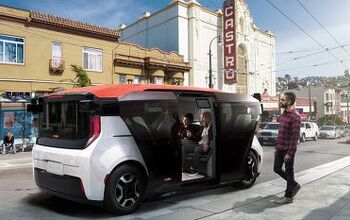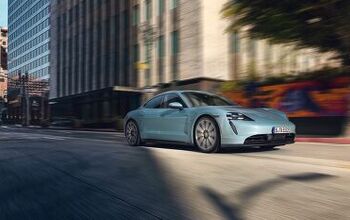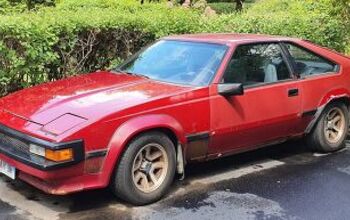The French Connection: GM-PSA Deal Will Bring Iran To Its Knees

Now we know why GM bought seven percent of PSA, a move for which most of the industry had no explanation. Forget overcapacity and scale effects. It was a carefully crafted plan to bring traffic in the Iran to a halt. Stuxnet is nothing compared to this.
Today, management of France’s PSA Peugeot Citroen will meet and decide whether it will continue to cut off Iran Khodro from the supply of parts needed to build the 206 and 405 vehicles, Just Auto says. PSA confirmed that it had already stopped shipping parts to the Iran for the month of March.
After the linkup between PSA and GM was announced, TTAC asked how a still partially U.S. government owned company can live with the fact that one of its partners is providing aid, comfort and car parts to the enemy. A day later, an influential US anti-Iran lobby group called on GM and Peugeot to shut down Peugeot’s Iran business due to Tehran’s suspect nuclear program.
Mark Wallace, a former US ambassador to the United Nations and head of United Against Nuclear Iran group said:
“As a working partner and now official stake-owner of Peugeot, GM owes it to its investors and customers to compel Peugeot into ending its business in Iran. By doing business directly with the Iranian regime, Peugeot supports the regime’s ability to develop its illegal nuclear weapons program, support terrorist proxies and repress the Iranian people.”
Shortly thereafter, GM announced that PSA had suspended shipments of vehicle components to Iran Khodro and that its alliance with Peugeot “is fully compliant with U.S. law governing trade with Iran.” PSA will decide month-to-month whether to ship parts to Teheran, GM will make sure that it won’t.
With an annual capacity of a million cars, and with its 2011 production hovering close to capacity, Iran Khodro is by far the largest automaker in the Middle East. With a size comparable to Chery or Geely, Iran Khodro would rank at around place 20 on the worldwide scale of automakers, if it would rank. For some strange reason, Iran Khodro has been boycotted by or did boycott OICA for many years.
Iran Khodro (aka IKCO) has a long standing relationship with PSA Peugeot-Citroen, and France. Ayatollah Khomeini had lived in French exile and returned to the Iran on an Air France jet. France’s Total was one of Iran’s largest oil customers. The Peugeot 405 based Samand is known as “Iran’s national car.” IKCO also builds Peugeot badged iron like the 206, 405, 407 and a rear-drive Roa, a bizarre mixture of a 405 bodyshell with the rear-drive running gear of the Paykan, aka the Hillman Hunter. Iran Khodro is dependent on core components coming from France, an extended boycott could result in a breakown of its car production and in unrepaired cars after they had broken down. Iran had been busy establishing new suppliers in China, but even the Chinese complained for quite a while that payments from the Iran had become complicated. By now getting money in and out of the Iran is pretty much impossible.
I am sure the breakdown of Iran’s automotive infrastructure was an unintended consequence of the GM-PSA linkup, but I am confident that someone will claim credit and say that this was all part of the plan. Ironically, the Iran had threatened two years ago to stop parts imports and to bankrupt Peugeot. Someone finally implemented the plan, and it was not Iran.

Bertel Schmitt comes back to journalism after taking a 35 year break in advertising and marketing. He ran and owned advertising agencies in Duesseldorf, Germany, and New York City. Volkswagen A.G. was Bertel's most important corporate account. Schmitt's advertising and marketing career touched many corners of the industry with a special focus on automotive products and services. Since 2004, he lives in Japan and China with his wife <a href="http://www.tomokoandbertel.com"> Tomoko </a>. Bertel Schmitt is a founding board member of the <a href="http://www.offshoresuperseries.com"> Offshore Super Series </a>, an American offshore powerboat racing organization. He is co-owner of the racing team Typhoon.
More by Bertel Schmitt
Latest Car Reviews
Read moreLatest Product Reviews
Read moreRecent Comments
- Ltcmgm78 It depends on whether or not the union is a help or a hindrance to the manufacturer and workers. A union isn't needed if the manufacturer takes care of its workers.
- Honda1 Unions were needed back in the early days, not needed know. There are plenty of rules and regulations and government agencies that keep companies in line. It's just a money grad and nothing more. Fain is a punk!
- 1995 SC If the necessary number of employees vote to unionize then yes, they should be unionized. That's how it works.
- Sobhuza Trooper That Dave Thomas fella sounds like the kind of twit who is oh-so-quick to tell us how easy and fun the bus is for any and all of your personal transportation needs. The time to get to and from the bus stop is never a concern. The time waiting for the bus is never a concern. The time waiting for a connection (if there is one) is never a concern. The weather is never a concern. Whatever you might be carrying or intend to purchase is never a concern. Nope, Boo Cars! Yeah Buses! Buses rule!Needless to say, these twits don't actual take the damn bus.
- MaintenanceCosts Nobody here seems to acknowledge that there are multiple use cases for cars.Some people spend all their time driving all over the country and need every mile and minute of time savings. ICE cars are better for them right now.Some people only drive locally and fly when they travel. For them, there's probably a range number that works, and they don't really need more. For the uses for which we use our EV, that would be around 150 miles. The other thing about a low range requirement is it can make 120V charging viable. If you don't drive more than an average of about 40 miles/day, you can probably get enough electrons through a wall outlet. We spent over two years charging our Bolt only through 120V, while our house was getting rebuilt, and never had an issue.Those are extremes. There are all sorts of use cases in between, which probably represent the majority of drivers. For some users, what's needed is more range. But I think for most users, what's needed is better charging. Retrofit apartment garages like Tim's with 240V outlets at every spot. Install more L3 chargers in supermarket parking lots and alongside gas stations. Make chargers that work like Tesla Superchargers as ubiquitous as gas stations, and EV charging will not be an issue for most users.































Comments
Join the conversation
Bertel, you've definitely got more international experience than I do, but was it conscious effort or just rushed editing that left the article referring to "the Iran" so many times?
The USA harrasses a national enemy in every way possible, and this worked out just exactly how coming up to World War II? (I'm talking about Japan, which the USA treated in a similar fashion to how it is treating Iran now). Yes; I'm fully aware that the USA would most likely win WWIII. If living in a radioactive ash-heap could be consider 'winning'. Because it is well known that Iran has had nuke bombs for some 15 years, many of them purchased from 'scientists' in the prior Soviet union and (so-called) ex-Soviet 'republics'. Not to mention that Iran has a working relationship with North Korea - which has nukes. Perhaps giving trade a chance would work out for all concerned, instead of declaring economic war on Iran via the cutting off of global banking. I don't think global banking was even cut off for the Soviets during the cold-war, Japan or Germany in WWII, etc. As for Israel, they can take care of themselves well enough if there is an attack. (Of course, if Iran attacks Israel, Iran will be a nation of thick, green glass and not much else).